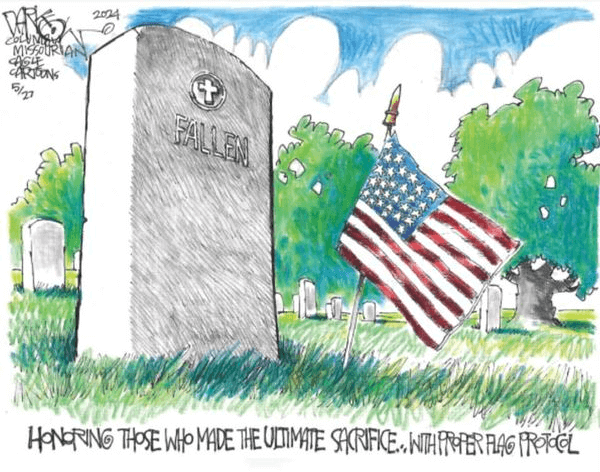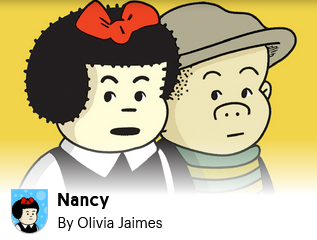CSotD: It’s Memorial Day Again and Again
Skip to comments
John Darkow leads us off with both a reminder of what Memorial Day is about, and how it differs from Veteran’s Day.
There were, understandably, a lot of days of recollection in the wake of the Civil War in which 750,000 died, and several versions of how those days were gathered into one national holiday, the most cited one being that it was started by a group of free Black people at what had been a POW camp in South Carolina.

That seems likely, given that it was John Jones, a fugitive slave and Underground Railroad conductor, who carefully marked and respectfully recorded the graves of nearly 3,000 Confederate POWs he buried near the prison camp at Elmira, New York. The dignity of the setting caused nearly all their families to leave them among their comrades rather than bringing their bodies home when the war had ended.
I like Darkow’s cartoon because he avoids the preachy cliche of reminding people to take the day as more than an excuse for a picnic. People should do that, of course, but I’d rather we reminded them of what it means than scold them as if our patriotism were better than their patriotism.
Which brings me to his mention of flag protocol. I find it bizarre that those who most loudly proclaim their love of country treat the flag with such disrespect. Perhaps strict flag protocol carries a tinge of idolatry, but there’s also a sense of dignity in taking it down in the rain and after sunset, in not wearing it as clothing, in not flying it dusty and tattered on the back of a truck, in not exploiting it as a commercial advertising tool.
And certainly it feels improper to wave it as a proclamation that my patriotism is better than your patriotism.

If surviving veterans of the Union and Confederate armies could meet in fellowship after the war, you’ve little right to re-divide their nation.

Grand Avenue (AMS) managed to offer a reminder with a minimum of preaching. It’s a deft touch that avoids schmaltz but makes its point.

Frazz (AMS) addresses the issue of hammering our swords into plowshares, and the inevitability of yet another war. I don’t know that I ever felt the dread Caulfield cites, since war was almost always depicted as exciting and heroic when I was little, and I wouldn’t have taken small children to “Saving Private Ryan” or other more graphic movies.
Besides, while my experience may not be universal, it seems the people who had experienced combat the most talked about it the least, while many who boasted of their adventures were eventually revealed to have served in New Jersey if they served at all.

Most people in our little town knew Bob Noody as the local barber who also drove a school bus and ushered at church. Few knew he had jumped into France on D-Day as a member of the 101st Airborne and been wounded there but recovered in time to fight at the Bulge. That’s him, clutching his bazooka gear.
He never denied it if it came up, but he didn’t brag, and he certainly had plenty of lost comrades to remember on Memorial Day.
Bob’s wife didn’t know what he was up to over there until he was home again. As it happens, I covered a long-delayed medal ceremony in Maine for a fellow who had been a tunnel rat in Vietnam and his wife never knew that, either, until he was safe home.
It’s possible to worry enough for two.

Dave Granlund offered this cartoon last year, and I was reminded of a feature story I wrote about suicide, in which an expert said one issue for older people is that they feel their young selves have been forgotten, that people see them only as impaired, incapable old folks and not as the vibrant person who once accomplished great and important acts.

Oliver Wendell Holmes Jr., thrice-wounded Civil War veteran who rose to the Supreme Court, gave what may be the most famous Memorial Day speech in 1884, and it’s well worth clicking here to read the whole thing. As a combat veteran, he spoke of actions he attributed not to amazing heroism so much as to the ability to rise to the occasion when necessary.
(W)hen we do honor to the dead in terms that must sometimes embrace the living, we do not deceive ourselves. We attribute no special merit to a man for having served when all were serving. We know that, if the armies of our war did anything worth remembering, the credit belongs not mainly to the individuals who did it, but to average human nature.
And yet, in the most oft-quoted line of his speech, he concedes
Through our great good fortune, in our youth our hearts were touched with fire. It was given to us to learn at the outset that life is a profound and passionate thing.
Holmes also takes pains to honor the flood of young widows created in that war, “those still living whose sex forbade them to offer their lives, but who gave instead their happiness.”

Which brings us to a collection of Memorial Day cartoons from a century ago which you can find at Paul Berge’s website, including this Ding Darling piece.
Some great poetry emerged from World War I, from the pens of Wilfred Owen and Siegfried Sassoon. Sassoon was known as “Mad Jack” for his outrageously bold exploits in the trenches, but turned against the war later, as did Owen, who was killed in its final week.
Those links will take you to their poems, but for a book-length prose memoir, I’d recommend their mutual friend, Robert Graves, who wrote Goodbye to All That about his experiences at the front, and afterwards:
England looked strange to us returned soldiers. We could not understand the war-madness that ran wild everywhere, looking for a pseudo-military outlet. The civilians talked a foreign language. I found serious conversation with my parents all but impossible.

As for those who, in Holmes’ war, were forbidden to offer their lives, the nursing which began there, and in the Crimea, came to flower in WWI, and Vera Brittain’s memoir, Testament of Youth, is a crucial and gripping account of a young woman’s service as well as of the profound losses she suffered in the course of that war.
How fortunate we were who still had hope, I did not then realise; I could not know how soon the time would come when we should have no more hope, and yet be unable to die. Roland’s letters—the sensitive letters of the newly baptised young soldier, so soon to be hardened by the protective iron of remorseless indifference to horror and pain — made the struggle to concentrate no easier, for they drove me to a feverish searching into fundamental questions to which no immediate answers were forthcoming.
She, too, found release in poetry, including The Lament of the Demobilized, which echoed the experiences of so many who managed to survive into the peace which followed:


I never found out how young Jacob Jackson from Massachusetts came to be buried here in New Hampshire, in the potter’s field section of the cemetery, his lonely grave unmarked until a few years ago, but I pause to remember him when I walk past, not because I think he knows somehow, but because I think we should know him, somehow.

Comments 10
Comments are closed.